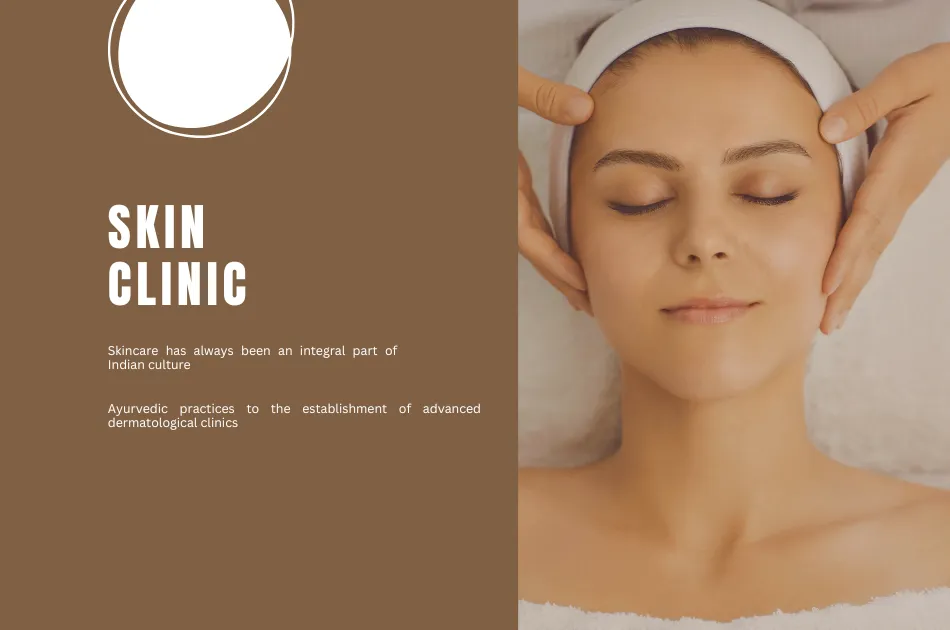- Admin
- May 02, 2025
- Healthcare
Explore India's Top Skin Clinics & Skincare Evolution
The Evolution of Skincare and Skin Clinics in India: From Tradition to Modern Science
Skincare has always been an integral part of Indian culture, deeply rooted in ancient traditions and evolving over centuries to embrace modern science.From the use of natural ingredients in Ayurvedic practices to the establishment of advanced dermatological clinics, India's journey in skincare reflects a blend of heritage and innovation.
Ancient Roots: Ayurveda and Traditional Practices
India's tryst with skincare began thousands of years ago with Ayurveda, the ancient system of medicine that emphasized holistic well-being.Natural ingredients like turmeric, sandalwood, neem, and aloe vera were commonly used to treat various skin ailments and enhance beauty.These practices were not merely cosmetic but were aimed at maintaining the balance of the body and mind.
Traditional rituals included oil massages, herbal baths, and the application of natural pastes, which were passed down through generations.These methods were personalized, considering individual body types and environmental factors.
Colonial Influence and the Birth of Modern Dermatology
The British colonial era introduced Western medical practices to India, leading to the formal study of dermatology.In 1895, the first chair of dermatology was established at Grant Medical College in Bombay, marking the beginning of structured dermatological education in the country .ResearchGate+2PMC+2IJDVL+2
This period saw the integration of Western techniques with traditional knowledge, paving the way for a more comprehensive approach to skin health.Hospitals began to set up dedicated dermatology departments, and skin diseases started receiving focused attention.
Post-Independence Developments: Expanding Access and Awareness
After gaining independence in 1947, India prioritized healthcare, leading to the expansion of medical infrastructure.Dermatology departments became commonplace in medical colleges, and specialized training programs were introduced.
Public awareness about skin health grew, and people began seeking medical advice for conditions previously considered trivial.The establishment of professional bodies like the Indian Association of Dermatologists, Venereologists, and Leprologists (IADVL) further standardized practices and promoted research.ResearchGate
The Rise of Skin Clinics: Bridging Tradition and Technology
The late 20th century witnessed a surge in standalone skin clinics across urban and semi-urban areas.These clinics offered specialized services, combining traditional remedies with modern treatments.Procedures like chemical peels, laser therapy, and microdermabrasion became accessible to a broader population.
Clinics began to cater not only to medical needs but also to aesthetic desires, addressing issues like pigmentation, acne scars, and aging signs.This shift reflected a growing consciousness about appearance and self-care among Indians.
Technological Advancements: Embracing Innovation
The 21st century brought significant technological advancements to skincare.High-precision equipment, AI-driven diagnostics, and minimally invasive procedures revolutionized treatment methods.Clinics started offering personalized skincare regimens based on genetic profiling and lifestyle analysis.
Teledermatology emerged, allowing patients in remote areas to consult specialists through digital platforms.This innovation improved access to quality care and facilitated continuous monitoring of chronic skin conditions.
The Importance of Skincare: Beyond Aesthetics
Skincare is not merely about appearance; it's a vital aspect of overall health.The skin acts as a barrier against environmental hazards, regulates body temperature, and prevents dehydration.Neglecting skin health can lead to infections, allergic reactions, and systemic issues.
Moreover, skin conditions often reflect internal health problems.For instance, persistent acne may indicate hormonal imbalances, while sudden rashes could signal allergic reactions or autoimmune disorders.Therefore, regular skin check-ups are essential for early detection and prevention of broader health issues.The Times of India+1en.wikipedia.org+1
Mental Health and Skincare: An Interconnected Relationship
The link between skin health and mental well-being is profound.Skin conditions like psoriasis, eczema, and acne can lead to emotional distress, affecting self-esteem and social interactions.Conversely, stress and anxiety can exacerbate skin problems, creating a vicious cycle .India Today
Recognizing this connection, modern skin clinics adopt a holistic approach, incorporating psychological support and stress management techniques into treatment plans.This comprehensive care ensures better outcomes and enhances the quality of life for patients.
The Role of Skin Clinics in India Today
Today, skin clinics in India play a pivotal role in promoting skin health and confidence.They offer a wide range of services, from treating chronic conditions to providing cosmetic enhancements.Clinics are equipped with state-of-the-art technology and staffed by trained professionals who stay abreast of global advancements.
In regions like Kanyakumari District, access to quality skincare has improved significantly.Residents can now avail themselves of top-notch services without traveling to metropolitan cities.For those seeking reliable options, Top Skin Clinics in Kanyakumari District for Clear Skin provides a curated list of trusted establishments.
Conclusion: Embracing a Holistic Skincare Journey
India's skincare journey reflects a harmonious blend of ancient wisdom and modern science.From the use of natural remedies in Ayurveda to the adoption of cutting-edge technology in contemporary clinics, the focus has always been on achieving healthy, radiant skin.
As awareness grows and access improves, more individuals are recognizing the importance of skincare in overall well-being.By embracing a holistic approach that considers physical, emotional, and environmental factors, we can ensure that our skin remains a true reflection of our inner health and vitality.




Share on